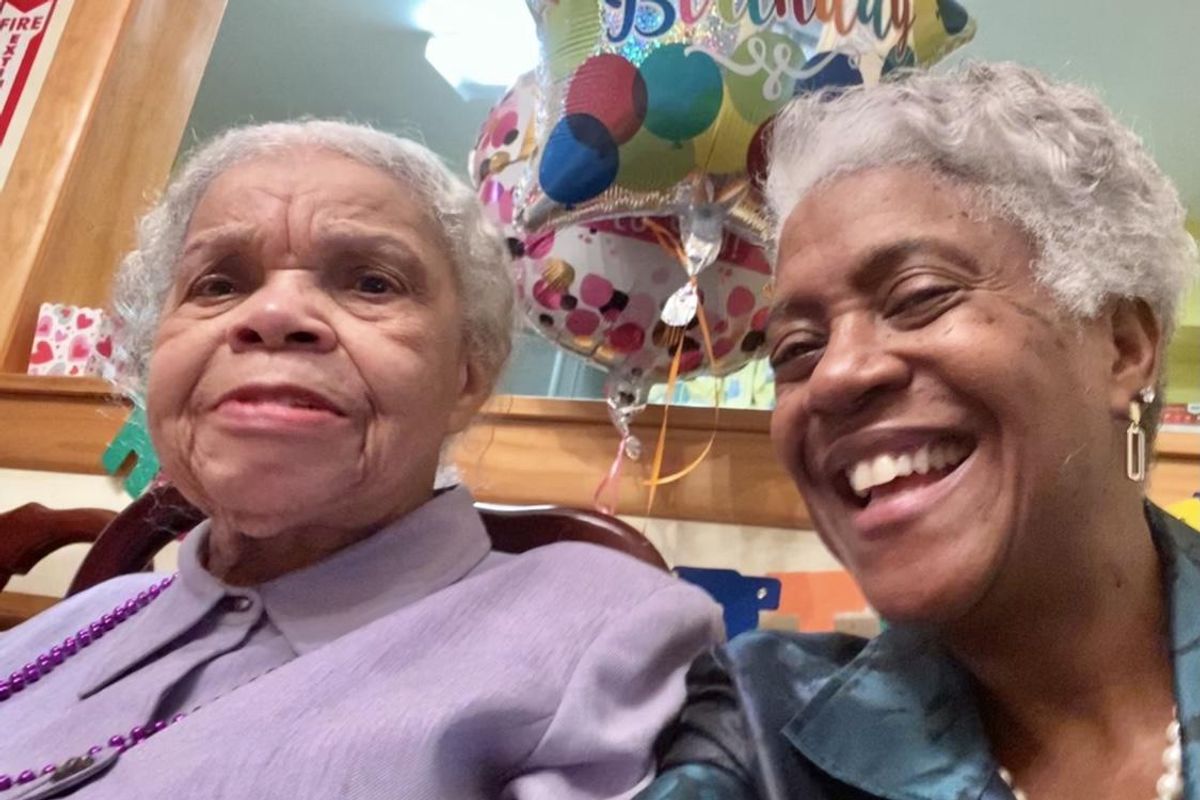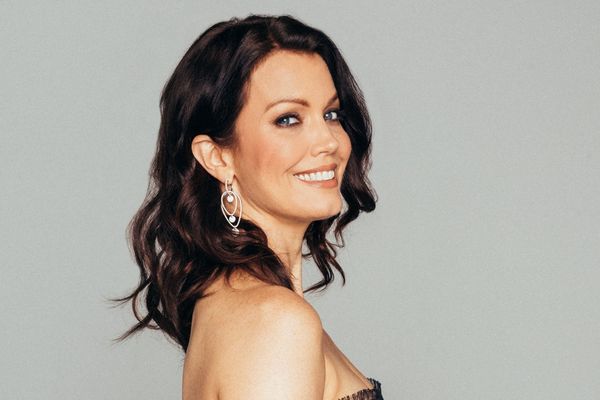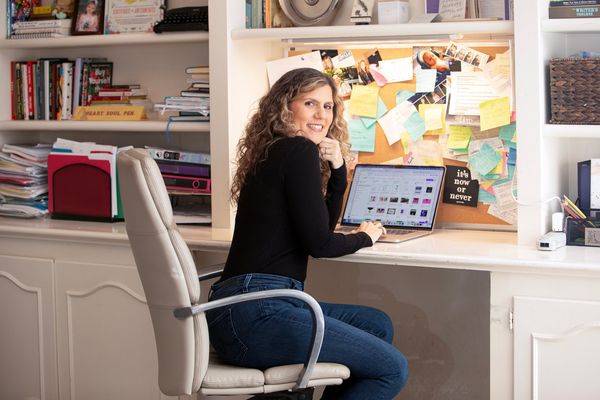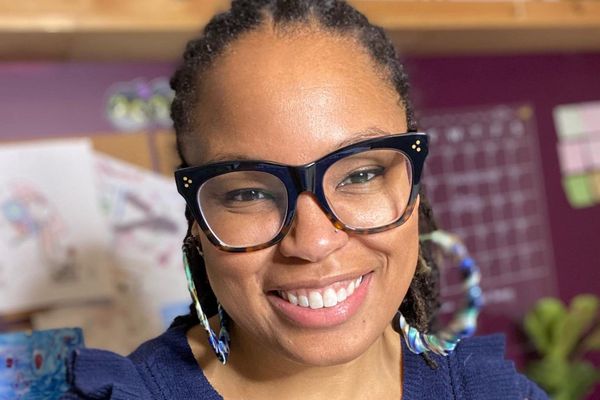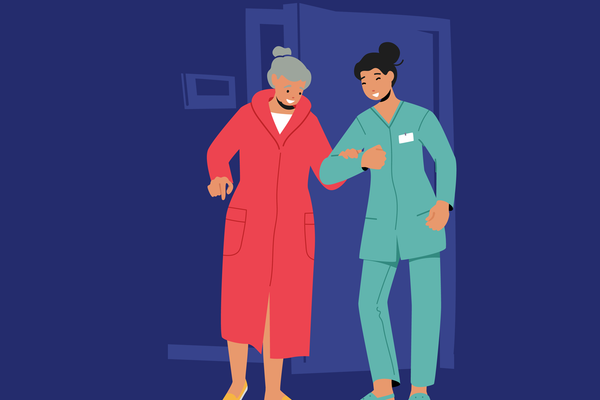November is National Family Caregivers Month
Six years ago on my 55th birthday, my mother, Doris, stopped recognizing me.
It was the hardest day of my life.
Her group home threw a party for me, and one of the resident's played "Happy Birthday" on his harmonica. My mother, Doris Woodward, didn't understand what was happening and threw her piece of cake on the ground. I kept it together and tried to keep the mood light. But, after the party was over, I went back to my car and sobbed.
When my mother was diagnosed with Alzheimer's disease in 2006 at age 77, I was shocked. Beyond a distant uncle, no one in our family had suffered from a memory disorder. My great-grandmother died at 106 and my grandmother at 98. I always thought it would be the same for my mother.
Fourteen years into her diagnosis, my mother is now nonverbal, and I know more about memory disorders and all their nuances than I ever thought possible. After my mother was diagnosed, I threw myself into the multifaceted role of caregiver, researcher and health advocate. I made it my mission to learn as much as I could about Alzheimer's disease.
Something important to know about my mother is that she never wanted to be a burden to her children. She made my sister and me promise we would never have her move in with us. She didn't want us to be full-time caregivers if her health declined.
Although she offered that basic piece of information and we had an advance directive she'd filled out, we had never discussed the specifics of a memory disorder or where she would want to live if she needed a higher level of care than the assisted living facility she lived in.
As her disease progressed, I made the decision to move her into a group home for people with memory disorders where she receives around-the-clock care. It was a decision fraught with emotion and guilt. I wasn't completely sure if it was what she truly would have wanted. But, by then she had deteriorated to where she was unable to make any cognitive decisions. With my sister ill with multiple sclerosis, it was up to me to make those choices for my mother.
Every day is different with Alzheimer's. You just don't know how it's going to play out. Some people have hallucinations or wander, while others don't. You can learn and prepare for any possible outcome, but there's no one-size-fits-all treatment plan. Early on, I trained myself not to anticipate what's going to come next: I was going to take every behavior that happened in stride. I was going to wait to see what happens next instead of bracing myself for conditions she might not develop.
Not every day as a caregiver is full of worry and sadness: There are also moments of joy, and it's important to appreciate them. My mother and I play with Legos together and indulge in a piece of cake (her favorite). She still experiences happiness. But not everyone understands that.
Unfortunately, there's a stigma attached to Alzheimer's disease and other memory care disorders. It's not like cancer, where friends and family bring by food or offer to do housework. My mother's friends stopped by to see her at first, but as the years went on, the visits stopped. They don't know how to spend time with someone who's nonverbal, when really it isn't that difficult: Read to her, share memories with her. She might not be able to communicate, but she knows you're there.
Every caregiver will tell you how alone they feel sometimes, despite the help that's available. It can be emotionally exhausting, and coping with those feelings takes a toll. From the beginning, my husband, Tim, was my complete and total caregiving partner. He took my mother to medical appointments and out to lunch. He was also the person I drew my strength from. When he died suddenly four years ago, I thought to myself, "How am I going to do this?"
That's when I learned the true power of support groups and having a vast network of resources. Members of my church got together to divide up the tasks my husband used to take on. They visit my mom if I'm away on a speaking engagement. I've developed strong relationships with the aides who care for my mother each day, especially Janet Wright who is the best caregiver I've ever met, as well as the healthcare providers who treat her.
Then there's the caregivers I've connected with online who are also caring for loved ones with memory disorders. One of my closest friends is a woman I met online who lives in a rural county outside Saint Louis. There are only two things we have in common: Our husbands are retired police officers and her husband and my mother have Alzheimer's disease.
She was one of the people I turned to when my mother broke her ribs and was hospitalized. My mother's group home restricted visitors due to the COVID-19 pandemic, and I couldn't be there to help her recover. The pandemic and the ensuing lockdown have made it harder than ever before to be a caregiver. I feel an incredible amount of guilt for not being able to physically see my mother, even though I know it is the safe thing to do. And no one understands that feeling better than my fellow caregivers.
The best advice I have for people who are caregivers for loved ones with memory disorders is to keep the faith. Don't be afraid to reach out for help or support because no one can do it alone.
And while you grieve the loss of the life your loved one used to live, appreciate the relationship you have with them now. My mother might not know who I am anymore, but I know she loves me — and that is enough.
Loretta Woodward Veney is an inspirational speaker and the author of "Being My Mom's Mom."
Resources
Alzheimer's Association
UsAgainstAlzheimer's
This resource was created with support from Biogen.

